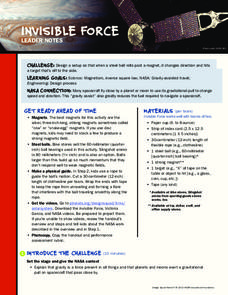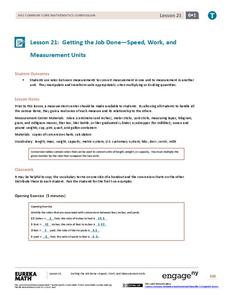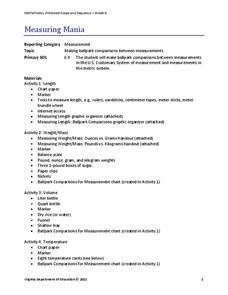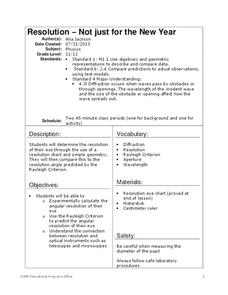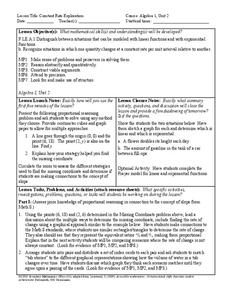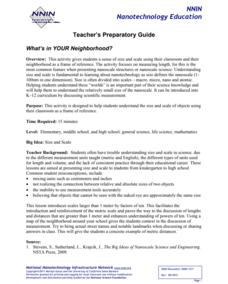Mathematics Assessment Project
Glasses
Clink, clink! Young mathematicians investigate drinking glasses composed of known solids (cones, cylinders, and hemispheres). Next, they determine the volumes of these glasses.
Mr. E. Science
Motion
An informative presentation covers motion, metric system, conversions, graphing of coordinates and lines, speed, velocity, and acceleration problems, as well as mean calculations. This is the first lesson in a 26-part series.
Science Friday
Make a Model Eardrum to Detect Sound Waves
Make sound waves visible with an experiment that asks middle schoolers to build a model ear drum using plastic bottles, rubber bands, plastic wrap, and sand-like substances.
West Contra Costa Unified School District
Congruent and Similar Polygons
What's similar about congruent and similar polygons? Young mathematicians first measure the side lengths and angles of given figures. They use these measurements to determine relationships between side lengths and angles of congruent and...
NOAA
The Biggest Plates on Earth
The deepest part of the ocean is the Marianas trench where two tectonic plates meet. Scholars explore plate tectonics and their boundary types by completing hands-on activities throughout the lesson. Specific areas, such as the Galapagos...
K5 Learning
Space Based Astronomy
How much astronomy can you study with the naked eye? Learn more about the ways scientists explore the galaxy with a short reading passage and set of short-answer questions.
EngageNY
Fundamental Theorem of Similarity (FTS)
How do dilated line segments relate? Lead the class in an activity to determine the relationship between line segments and their dilated images. In the fourth section in a unit of 16, pupils discover the dilated line segments are...
Illustrative Mathematics
Rainfall
Find the how long it has been raining based upon the amount of rainfall. Scholars analyze a table of the amount of rainfall as a function of time. Pupils first determine whether the function is invertible, then they find and interpret...
PBS
Invisible Force
Investigate invisible forces. Young engineers design a setup that changes the direction of a steel ball using a magnetic force. The purpose of the setup is to model the gravitational pull of spacecraft by planetary bodies.
Chicago Botanic Garden
Climate Change Around the World
Look at climate change around the world using graphical representations and a hands-on learning simulation specified to particular cities around the world. Using an interactive website, young scientists follow the provided directions to...
Virginia Department of Education
Linear Curve of Best Fit
Is foot length to forearm length a linear association? The class collects data of fellow scholars' foot length and the length of their forearms. They plot the data and find a line of best fit. Using that line, they make predictions of...
Virginia Department of Education
Curve of Best Fit
Which function models the data best? Pupils work through several activities to model data with a variety of functions. Individuals begin by reviewing the shapes of the functions and finding functions that will fit plotted data points. By...
EngageNY
Getting the Job Done—Speed, Work, and Measurement Units
How do you convert from one measurement to another? Pupils use unit rates to convert measurements from one unit to another in the 21st segment in a 29-part series. They convert within the same system to solve length, capacity, weight,...
Curriculum Corner
Second Grade Summer Math Practice Book
Stop the summer lag with a set of second grade Common Core based math practice sheets. Learners fill in hundreds charts with missing numbers up to 1,000. They practice writing numbers in standard, expanded, and word form. Children also...
Virginia Department of Education
Measuring Mania
Conversion immersion — it's measuring mania! A set of four activities teaches scholars to convert between customary and metric units. Resource covers unit conversions in length, temperature, weight/mass, and volume.
Illustrative Mathematics
Growing Bean Plants (Grade 2)
After planting a bean seed in a jar, young scientists observe the growth patterns over several days. As the bean becomes a sprout, and the sprout becomes a plant, partners measure and plot the data. They notice patterns, practice...
Cornell University
Resolution—Not Just for the New Year
Experiment with optical resolution using an inquiry-based lesson. Young researchers calculate fellow classmates' optical resolutions. They apply the information to understand the inner workings of optical instruments.
DiscoverE
Spaceship to Mars
Feel like a rocket scientist for the day. Using only paper and tape, scholars create a framework for a spaceship to Mars. Each sheet of paper costs $10 million and each piece of tape costs $100,000. Make sure you stay within budget!
101 Questions
Styrofoam Cups
How many cups does it take to reach the top? Learners attempt to answer this through a series of questions. They collect dimension information and apply it to creating a function. The lesson encourages various solution methods and...
101 Questions
Toilet Paper Roll
You won't want to flush a great lesson down the drain! An intriguing resource asks learners to predict the number of sheets of toilet paper on a roll. Presented with the dimensions of the roll and one sheet of paper, scholars make...
Howard County Schools
Constant Rate Exploration
Question: What do rectangles and bathtub volume have in common? Answer: Linear equations. Learn how to identify situations that have constant rates by examining two different situations, one proportional and one not proportional.
National Nanotechnology Infrastructure Network
What’s In Your Neighborhood?
Chart your way to an understanding of nanoscale. Using a Google map, learners estimate a radius around their location of 1,000 and 1,000,000 meters. Predicting what 1,000,000,000 meters would look like takes them off the charts!...
US Department of Energy
Go Far Cars Ramp: A Basic Ramp with Four Height Settings
Precise measurements make the job easier! One of the challenges when using an inclined plane for testing comes from pupils not using exact measurements. They often rely on books that slide or different ramp lengths when experimenting. By...
101 Questions
Pokémon Go Cheat
Gotta catch them all—no learner left behind! Young scholars must predict the length of time it takes a phone attached to a fan to travel five kilometers given the radius and rotations versus time data. Why would you attach a phone to a...
Other popular searches
- Centimeters and Meters
- Millimeters Centimeters
- Centimeter and Meter
- Centimeters and Millimeters
- Measuring Centimeters
- Centimeters and Decimeters
- Centimeter Grid Paper
- Centimeters Decimeters
- Inches and Centimeters
- Centimeter Second Grade
- Square Centimeters
- Convert Centimeters and Meters










